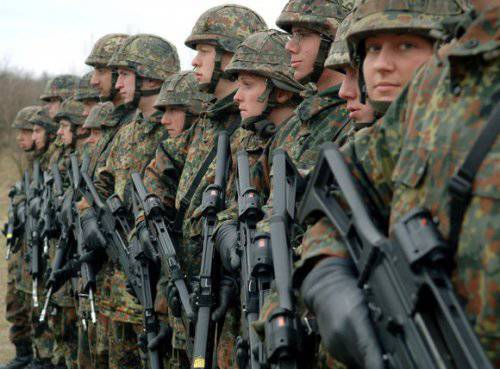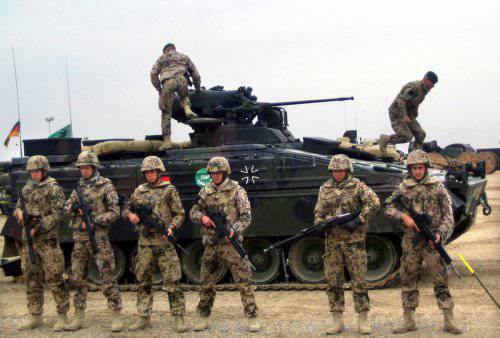"German or in boots, or under a boot"
The question of what should be the armed forces of the country, in German society has long been discussed, and, as polls show, there are no indifferent. The fact is that military service for Germans since ancient times was considered not just an honorable duty. According to most researchers, the Germans belong to the most pugnacious peoples and fight not only because of their own goals. Quite often, when they do not have war at home, they seek it abroad. And it was not by chance that a saying was once spread in Germany: “German, either in boots, or under a boot.”
It is known that the German army has one of the longest and richest military histories. And if in the early centuries it was exclusively hired, then later the system of recruitment appeared. And in 1871, with the proclamation of the German Empire, universal military service was introduced. By 1914, Germany had one of the largest and most well-armed European armies (808.280 men).
After the defeat in World War I, Germany, under the terms of the Versailles Peace Treaty of 1919, had the right to recruit the army only by voluntary hiring, and its number was limited to 100.000 people, including 4.000 officers. With the advent of Hitler in 1933 and the creation of the Wehrmacht in 1935, universal military duty was again introduced, which was to unite the nation and form a massive armed forces. Defeat in World War II again deprived Germany of national armed forces for a decade. In 1950, Chancellor Adenauer proposed the formation of a German national army that would become part of the Western European Union and NATO in the future, and the formation of the Bundeswehr began in 1955.
In it, in order to avoid the reanimation of militarism, it was decided to fully implement democratic civilian control. Namely - the authority of leadership over the armed forces was given to the civilian minister of defense, the army was placed under parliamentary control. The officers were to command through respect, not coercion, and serve as an example of a "democratic soldier."
The call for military service in the Bundeswehr was announced in 1956 and was endowed with a new democratic meaning. The call was defined as an instrument of democratic civilian control and a condition for the inextricable link between German society and the army. It was then that a clause appeared in the law on military duty, which stated that if there are serious reasons to refuse military service for moral reasons, such can be considered. True, those who did not want to stand up in the ranks of the soldiers should have clearly and convincingly explained their beliefs. And such, by the way, were very few - those who did not want to stand up for the protection of the Fatherland were considered cowards in society. And the replacement of a military duty by a civil one was complicated by the fact that for the latter there was no separate law.
The “Alternative Civil Service Act” entered into force on January 20 1960. But another year was needed to create the base. 10 April 1961, the first 340 young people entered the service - an alternative to the military. Today, it is considered one of the pillars of the entire social system in Germany. In accordance with the law 1983 of the year, persons recognized as refusing military service perform those tasks that serve the common good, primarily in the social sphere. Currently, almost 76 of thousands of men "serve" for nine months in nursing homes, catering, charity and church organizations. And, of course, the refusal of conscription, in fact, eliminates alternative service, and at the same time will deal a serious blow to the social system.
Surveys recently conducted by the Leipzig Institute for Sociological Research have shown that public opinion in Germany has split over the issue of the abolition of conscription. So, 50 percent of respondents were in favor of abolishing the call, and 48 percent - for keeping it. In the German government itself there is also no consensus on the need to cancel the conscription.
The position of the Ministry of Defense outlined above is known. However, how much will she find approval in the government? After all, the Chancellor herself has repeatedly said that military conscription should remain. There is doubt that Zu Guttenberg will be able to enlist the support of the ranks of his own party, the Christian Social Union. For example, Ernst-Reinhard Beck, spokesman for the CDU faction on defense issues, believes that conscription turned out to be the most effective form of defense for Germany. He also called the “doubtful” proposal “to sacrifice this proven tool of security policy to sacrifice budget savings”.
Representatives of the Social Democratic Party of Germany (SPD) proposed their own concept of reform of the Bundeswehr, which is largely at variance with the plans of the Minister of Defense Carl-Theodor zu Guttenberg. In particular, the Social Democrats propose to reduce the number of the Bundeswehr by only 50 thousand people, from 250 thousand to 200 thousand, and leave the conscription service, which, however, will have to be voluntary.
The SPD fears that the abolition of conscription will transform the Bundeswehr from the national army into an expeditionary corps, focused mainly on foreign operations. Social Democrats believe that the number of recruits serving voluntarily should be no less than 25 thousands.
In addition, according to the military expert of the SPD Rainer Arnold, the structure of the Bundeswehr needs to be revised. In particular, the number of ground forces, in his opinion, needs to be increased, but in the Luftwaffe you can reduce entire squadrons, such as the 33 th squadron based on the Büchel in Rhineland-Palatinate, whose aircraft carry US nuclear bombs like B61. Taking into account the intentions voiced by the Foreign Minister of Germany Guido Westerwelle to abandon the nuclear weapons in Germany, this unit, as noted by Arnold, in the future may be disbanded.
It is noted that among the supporters of the Green Party, 71 spoke out for a percentage of those polled, 58 percent among supporters of the Left Party, and 57 percent among voters voting for FDP liberals.
Meanwhile, among the citizens who support the large "people's" parties, supporters of the preservation of military service prevail. 54 supported the percentage of supporters of the CDU / CSU and as many supporters of the Social Democratic Party in favor of maintaining the draft.


Information